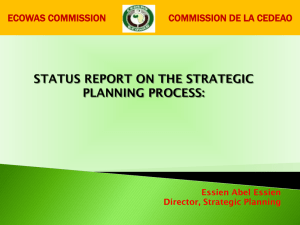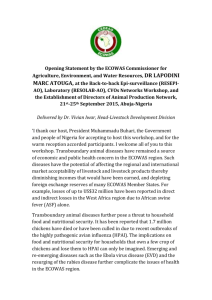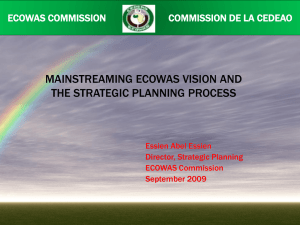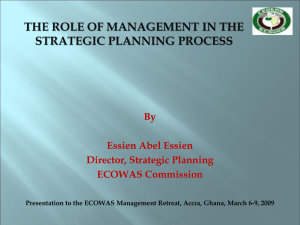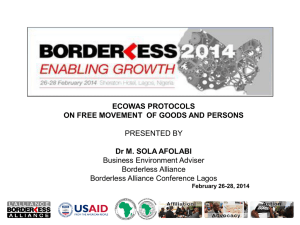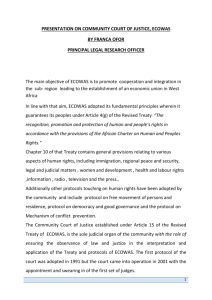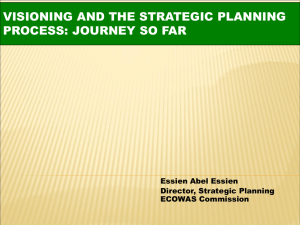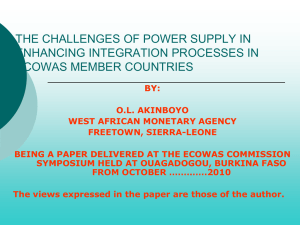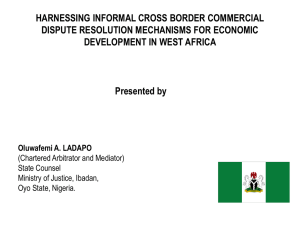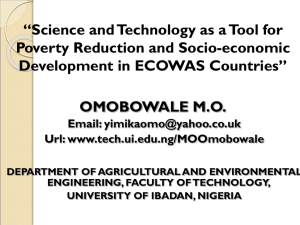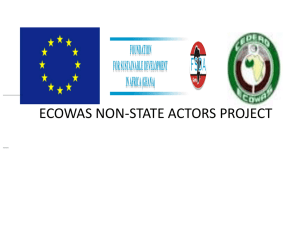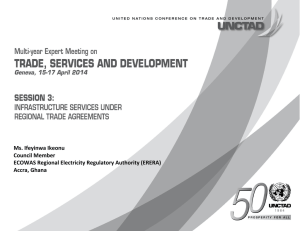English - African Centre for Statistics
advertisement
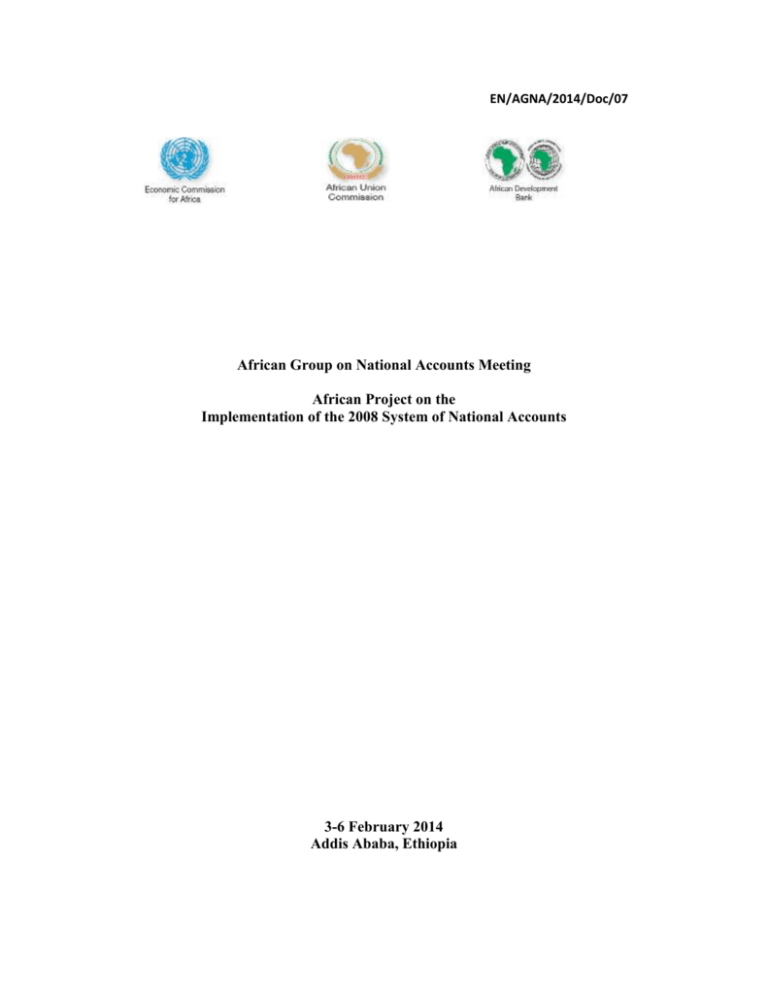
EN/AGNA/2014/Doc/07 African Group on National Accounts Meeting African Project on the Implementation of the 2008 System of National Accounts 3-6 February 2014 Addis Ababa, Ethiopia Strengthening or Establishing Governance and Coordination Structures at National Level (ECOWAS Perspective) 1. IntroductionThis is a proposal on governance and coordination structure from the perspective of the ECOWAS Commission based on her experience in the implementation of regional statistical programmes. It is recommended, whatever the coordination and governance structure need to be put in place, it is necessary that it considers and incorporate what is already existing in the states and at the sub-regional level. This is to create synergy, avoid duplication of efforts and promote judicious use of resource. 2. The Current Governance and Coordination Structure at ECOWAS At the ECOWAS level there are three levels of coordination and governance structure at the country level, namely: A. Steering Committee B. Technical Committee C. Taskforce/work groups The chairperson for each of the Committees are nominated from the Member States, ECOWAS Commission serves as coordinating secretariat of the committees. Other regional institutions; WAMA, WAMI, AFRISTAT and UEMOA are Members/observers of these Committees. All Regional Statistical Programmes (RSP) are decided in consultation and approvals of the steering and technical committees. The taskforce monitor and assist with the implementation of the RSP at the country level. A. Steering Committee The Membership of the steering committee consist of 15 heads of National Statistics Offices (NSOs) in the ECOWAS region. The committee is responsible for endorsing and recommending to the Council of Ministers all the regional statistical programmes presented to her by the ECOWAS Commission. The heads of NSO are to provide resources for the implementation of programmes approved by the Council. The steering committee meet at least once a year and any other time as there may be urgent need for it. They are the overall coordinator and implementers of the regional programme at the country level. B. Technical Committee The technical committee members consist of the officers in-charge of the subject matter statistics in all the 15 Member States. They are responsible for day-to- day implementation of the regional statistical programmes. They are the focal persons for the subject matter statistics in their countries. Often, an official letter is written from ECOWAS Commission requesting the heads of NSO to designate a person as a member of the technical committee (no pay). The regional statistical programme and its implementation strategies are drafted in collaboration with the technical committee, who in-turn presented to their colleagues and supervisors at the national level for review. The technical committee meet at least once a year for peer review and for validation of work done. For the technical committee of function effectively, their appointment must be formalized in writing to the heads of national statistics offices and letting all the relevant stakeholders be aware. This will facilitate the follow-up on the implementation of the programme. For example, the technical committees can be contact directly without resorting to bureaucracy and get the work done. C. Taskforce/work groups The Taskforce/working groups are responsible for monitoring the implementation of the regional programmes in the Member States. They consist of 5 member states and the ECOWAS Commission as secretariat. The taskforce meet at least twice a year to review progress made by each member states (or consultants) and recommend the type of assistance required. 3. ECOWAS 2014 – 2018 National Accounts Programme Below is a summary of the ECOWAS Regional Statistical Programme for national accounts statistics for the period 2014 to 2018. The programme has already been approved and funding by the council of ministers. Some of the activities such as development of a common nomenclature based on ISIC rev 4 and CPC rev2 and a roadmap for its implementation have already been concluded. The funding for these activities is going to be sourced by the ECOWAS Commission, which is going to complement the AGNA sources. Establish a list of the changes introduced by the 2008 SNA, which are relevant for the countries Preliminary activities and bridge assistance to Member States Review the existing programmes on outstanding issues with the 1993 SNA, taking into account the 2008 SNA changes Training in General problem areas in respect to GDP estimates List of relevant changes introduced by the 2008 SNA Identify their implications Identification of relevant activities Short term and long term activities Classification of Countries Training and bridge assistance Adoption of new relevant classifications (RNA/RNP) and improvements in business registers Review of related source statistics compiled by the statistical office Review of related macroeconomic data sets compiled outside the statistical office Use of administrative data sources IT and staff resources Measurement of financial services Estimates at constant prices: development of suitable deflators Estimation of non-observed economy, informal, illegal and underground activities and estimates of owner occupied dwellings Measurements of the government sector: accruals, coverage (linked to the implementation of the revised GFS) Balancing in a supply and use framework and combining information coming from different data sources Improved measures of gross fixed capital formation and consumption of fixed capital Seasonal adjustments methods for quarterly national accounts. Training on Common tools for compilation of national accounts Training on any other theme that will affect the level of GDP Measurement of financial services: FISIM, Output of the Central Bank, insurance services, etc. Focus on those issues that are likely to have greatest impact on GDP and its main Expenditure on research and development (R&D) Military expenditure components. At the same time improvements to the integrated set of Other issues related to fixed assets: mineral exploration, accounts and major indicators such as databases and software, etc. GNI and Gross Saving should be pursued. Issues concerning informal and illegal activities Back-casting
